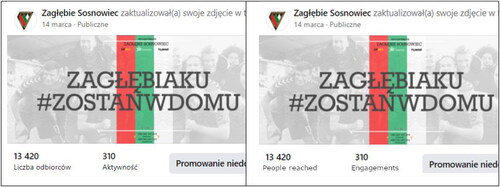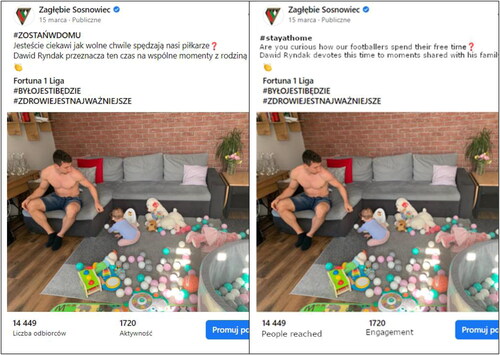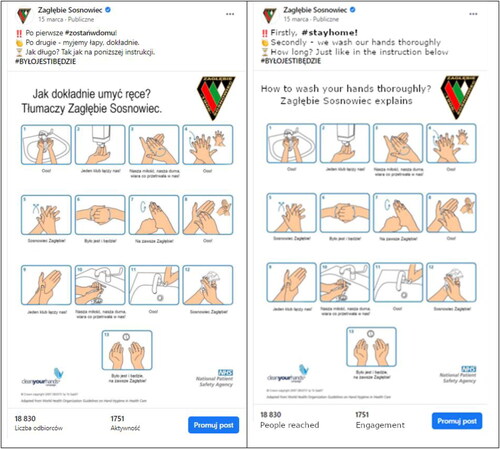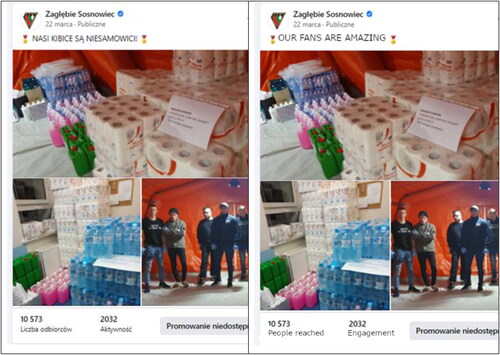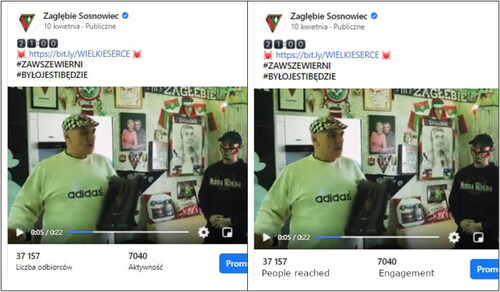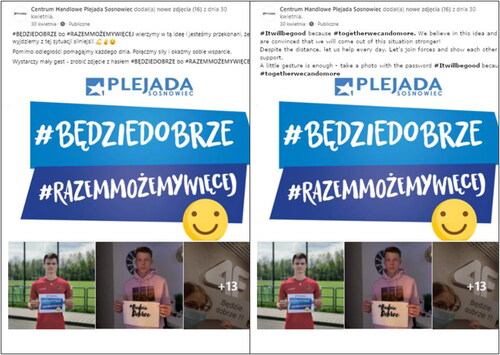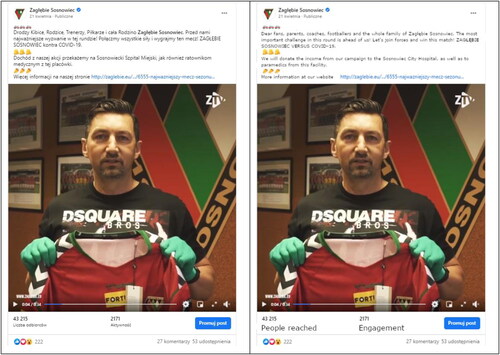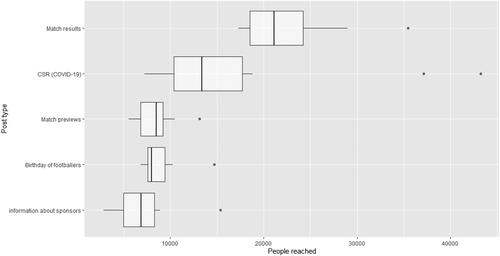 ?Mathematical formulae have been encoded as MathML and are displayed in this HTML version using MathJax in order to improve their display. Uncheck the box to turn MathJax off. This feature requires Javascript. Click on a formula to zoom.
?Mathematical formulae have been encoded as MathML and are displayed in this HTML version using MathJax in order to improve their display. Uncheck the box to turn MathJax off. This feature requires Javascript. Click on a formula to zoom.Abstract
The aim of the study is to identify, and present the CSR practices that have been, and are also currently being implemented by football clubs in the era of the Covid-19 pandemic. Moreover, it also strives to assess the impact of these practices on media coverage. The results of the research show that among the posts published by Zagłębie Sosnowiec on social media platforms, such as their official Facebook profile, and the posts about the results of the matches, tend to achieve the greatest reach. However, on the contrary, posts presenting the ongoing CSR initiatives for the local community come tend to take a backseat, and are considered to be secondary. Furthermore, when it comes to other posts that are related to sports activities or personalities (footballers' birthdays, match previews and information about sponsors), their reach does not tend to differ. From an empirical point of view, this study proves that CSR activities are an imperative element of building relationships with the club’s stakeholders.
1. Introduction
The coronavirus pandemic has contributed towards many changes in the way businesses operate across all the industries, on a local, national as well as global level. In March 2020, football games were suspended all around the world. It is also true, however, that some countries, despite the first wave of coronavirus rampaging the world, decided to continue their meetings. These countries included Belarus, Burundi and Tajikistan. These football leagues, though, are not considered to be prestigious in nature, and the teams in these countries do not usually achieve spectacular financial or athletic success. The low prestige of these games is evidenced by, among others, the lack of regular performances by their representatives in international competitions. Moreover, none of the clubs from Belarus, Burundi and Tajikistan have been amid the top 20 football clubs, in terms of the revenues that they generate (Deloitte, Citation2020).
Nowadays, sports clubs are usually equated with sports enterprises, and their management is considered to be a very niche and specific branch of management. It should be emphasized here that there are several important characteristics that distinguish sport management, as an atypical management category. For instance, firstly, the recipients need to maintain strong emotional ties with their suppliers (Walker & Heere, Citation2011). Therefore, it is because of these ties that the fans are compelled to travel thousands of kilometres to support their favourite teams. This emotional dependence is what has caused the development and establishment of the sports events tourism industry (Hadzik et al., Citation2015; Malchrowicz-Mośko, Citation2015). Another difference from traditional management practices is the exceptionally dynamic changes in the sports and media environment (Parganas et al., Citation2017), especially within the social media circles, that enables the initiation and sstrengthening of the relationships with fans (Vallerand et al., Citation2008). Thus, managing a sports club is a different from managing a business. However, in this case, a sound business ethic and impeccable business practice might not necessarily give the expected results in sports enterprises. In this regard, the specificity of the sport poses several challenges for managers, and implies the need to create a relevant action strategy (Kubiczek & Pietrzyk, Citation2020). Therefore, the analysis of the largest sports clubs shows that corporate social responsibility (CSR) is more often a very important aspect of their activities, which will help strengthen the relationship with the fans even more (Dimitropoulos & Vrondou, Citation2015).
For several years, an increase in the scientific publications regarding the role of CSR in sports has been observed. Despite the fact that many authors (Filizöz & Fişne, Citation2011; Kihl et al., Citation2014, Citation2014) have emphasized on the the essence of applying a practical approach in the CSR research, there are still a limited number of publications addressing the issue of the role of corporate social responsibility, in sport management. Moreover, unfortunately, the outbreak of the coronavirus pandemic has widened this research gap. This identified research gap can be described as a result of the insufficient number of scientific studies that have been able to address the issue of CSR from a micro perspective, particularly in the context of the impact of the coronavirus outbreak on sports club’s management.
The aim of this particular study is to recognise and present the CSR practices that are implemented by sports clubs, particularly in the era of the Covid-19 pandemic. Moreover, it is also aimed towards assessing the impact of these activities, on the sports clubs’ media coverage. This study specifically concerns a club with one of the longest traditions in Polish football, and is the largest in the region of Zagłębie Dąbrowskie. – Zagłębie Sosnowiec. In this context, in order to help achieve the assumed goal, the following research questions have been focused upon in this research: What CSR initiatives have Zagłębie Sosnowiec undertaken during the Covid-19 pandemic? What reach have the CSR-related posts generated? Does the reach of the posts differ significantly depending on the category that they belong to?
Keeping these research questions in mind, the paper is organized as follows. The first part presents an overview of the literature that is based on the concept of corporate social responsibility. There has been a particular emphasis on how to implement CSR in sports, as an element of strategy that focuses on building and promoting the image of a sports club. The second part describes the methodology that has been used in the study. The third fragment presents the results of the research that is based on the CSR initiatives undertaken by Zagłębie Sosnowiec during the pandemic. Lastly, the study ends with the discussion and conclusions surrounding the elements of the research.
2. Literature review
It is commonly believed that a company's success depends on its relationship with the environment that it nurtures (Freeman & Miles, Citation2002). The most important stakeholder of any organization is believed to be the consumer (Stawicka, Citation2016). The contemporary consumer is now increasingly aware and demanding of their choices and liking (Maciejewski, Citation2015). Growing consumer awareness means that organizations have to think about the activities that they undertake, and attach great importance to making these initiatives socially responsible and acceptable as well (Abdeen et al., Citation2016; Lii et al., Citation2013; Pomering & Dolnicar, Citation2009). If stakeholders are well aware of CSR, a company's CSR initiatives could result in financial gains for the company, whilst making sure that its image is maintained as well (Rhou et al., Citation2016; Su et al., Citation2021; Su et al., Citation2021).
CSR, as a concept, comes down, not only to the description of the relationship between business and the community (stakeholders), but it also means going beyond the classic economic activity of a company (Keinert, Citation2008; Newell, Citation2005). In addition to this, the implementation of these initiatives that are proposed by organizations is also expected by stakeholders in an effective, efficient and sincere manner (Kubiczek & Kantor, Citation2020; Maon et al., Citation2009; Park et al., Citation2014). Corporate social responsibility is a concept according to which an enterprise should not only generate profits, but also enhance the welfare that it spreads in the society (Blomstrom & Davis, Citation1975; Kim et al., Citation2017).
Due to the multitude of approaches and definitions that have been presented in the extant literature, it becomes important to precisely define CSR in the context of the discipline that has been taken into consideration. Therefore, in this study, CSR will be understood, as defined by (Dahlsrud, Citation2008; Marsden, Citation2001): “Corporate social responsibility is about the core behaviour of companies and responsibility for their total impact on the societies in which they operate. CSR is not an optional add-on nor is it an act of philanthropy. A socially responsible corporation is one that runs a profitable business that takes account of all the positive and negative environmental, social and economic effects it has on society”.
The active involvement in CSR initiatives brings tangible benefits to an organization, and it happens to have a positive impact on its subsequent activities (Secchi, Citation2007). In this regard, (Maciejewski, Citation2015) emphasizes that organizations tend to stop perceiving the consumer only as the recipient of their products, and begin to perceive them as a "part of the socio-cultural tissue". Therefore, when such concepts and definitions are taken into account, the CSR initiatives strengthen the relationship between the consumers and the business, as well as the customers’ confidence and loyalty towards the business (Abdeen et al., Citation2016; Castaldo et al., Citation2009; Du et al., Citation2011; Porter & Kramer, Citation2006; Ranaweera & Prabhu, Citation2003). In addition to this, (Walker & Heere, Citation2011) also treat CSR as an important factor in building an organization’s reputation. CSR that is focused upon the activities outside the organization, tend to strengthen its prestige (Farooq et al., Citation2017).
Typically, CSR activities and initiatives form the foundation of modern business strategies that focus on concepts such as transparency, responsiveness and the accountability of operations (Abdeen et al., Citation2016). In the football industry, the image of a team is the basis for fundraising, regardless of the source where it is coming from. The role of the relationship between sports and community has especially been emphasized by some researchers (Schulenkorf et al., Citation2016). In this regard, research by (Kubiczek & Kantor, Citation2020) shows that the true essence of the enterprise is the appropriate provision of information that is based on CSR activities. Moreover, communicating about CSR activities also plays a critical role in professional sport, as it displays an organizations intentions towards the greater good of the community as well (Sheth & Babiak, Citation2010).
Sports consumers are emotionally attached to sports clubs, and are thus involved in sports events in an active manner (Walker & Heere, Citation2011). Considering CSR as one of the most important strategy dimensions is the foundation of modern sports club management (Sheth & Babiak, Citation2010). CSR has evolved as an important area of activity for sports corporations primarily because of the increased recognition that they receive in terms of their ability to deal with key societal issues that exist around the world (Walters & Tacon, Citation2010). This is the reason why professional sport teams are increasingly engaging in activities that target community development agendas (Rowe et al., Citation2019). Furthermore, corporate community initiatives (CCI) have also become an important dimension of corporate social responsibility, particularly in the sports industry (Kihl et al., Citation2014), and the undertaken CCIs are usually consistent with the competencies of the initiators (Hess et al., Citation2002; Zappalà & Arli, Citation2010). Therefore, in the past years, sports clubs have been actively involved in supporting communities, in hopes of creating a positive social impact and maintaining a progressive image of the organization as well (Godfrey, Citation2009).
It is noteworthy that there is no particular methodology that professional sport managers may use, in order to support a community. This is because the needs of each community differ from time to time (Carrol, Citation1979). In this context, strong relationships with local communities help to understand their specific needs and expectations, in a better manner (Babiak & Wolfe, Citation2006). Keeping these intricacies in mind, considerations regarding the use of CSR initiatives in sport come down to the analysis of case studies and presentations of those clubs and organizations that have been successful in these endeavours. It is assumed that the analogous adoption by other clubs may also bring similar success (Filizöz & Fişne, Citation2011). In addition to this, (Kihl et al., Citation2014) emphasized on the role of the empirical description of CSR initiatives as a critical aspect that is required for sport management. Studies on CSR that has been initiated by the sports industry mostly concern, among other sports, football (Breitbarth & Harris, Citation2008)and American football (Babiak & Wolfe, Citation2006). In this regard, in their study, (Kubiczek & Kantor, Citation2020) present CSR practices that were undertaken by sports clubs in Poland before the outbreak of the COVID-19 pandemic.
The outbreak of the Covid-19 pandemic has had a negative impact on the financial situation of several enterprises, regardless of the sector that they belong to (Rizvi et al., Citation2020; Umar et al., Citation2021; Umar, Su et al., Citation2021). Nonetheless, (He & Harris, Citation2020) believe that the Covid-19 pandemic has also created opportunities for businesses to successfully implement CSR initiatives that will benefit the local community immensely. During the pandemic era, entrepreneurs have taken several different measures to mitigate the effects of the pandemic (Marom & Lussier, Citation2020). In this context, (Kantor & Kubiczek, Citation2021) observed that in Poland, one of the solutions for the lockdown of cultural institutions revolved around the activities that were undertaken for the benefit of the local community. The initiators of these activities were mainly the employees of these institutions. This observation has also been confirmed by the research results of another study. Moreover, (Mirza et al., Citation2020; Mirza et al., Citation2020; Yarovaya et al., Citation2021) found that human capital is the foundation of effective activity, particularly during the pandemic era.
3. Methodology of research
When taking into account the dynamic situation that is related to the Covid-19 pandemic, the popularization of the topic related to the operation of sports clubs for the local community is particularly an important one. For this purpose, in this specific study, the process of answering the research questions that were formulated was based on a case study analysis related to statistical inference. The choice of the case study was strongly related to the specificity of the method, and its adaptation to the current situation. Therefore, this method is aimed at discovering the uniqueness and complexity of a single case (Mizerek, Citation2017). Discovering the presence of a certain phenomenon in one sports club may provide a basis for repeating the study in other clubs as well.
The subject of this research is a football club playing at the second level of the Polish league (Fortuna 1 Liga) – Zagłębie Sosnowiec. The object of the research is the CSR policy conducted by this club in the era of the pandemic. Based on the data obtained from the club, the characteristics of social posts published on the social media channels pertaining to the club were thus determined.
The first stage of the research was an exploratory review of the activities of Zagłębie Sosnowiec, during the suspension of the football games. For this purpose, as many as 50 posts were analysed and divided into 5 thematic groups:
CSR (COVID-19),
Birthdays of footballers,
Match previews,
Match results,
Information about the sponsors.
From each of the categories identified, the last 10 posts on the topic (from October 2020) were selected. On this basis, the research hypotheses were defined and verified in relation to two approaches. In the first attempt, the last 10 posts were treated as the population of those posts, thus the descriptive statistics were referred to for the intergroup comparison. In the second attempt, the relevant posts were treated as a sample that was selected due to the criterion of time as a random variable. Therefore, the range fluctuations provided some randomness as a range-shaping factor. It should be emphasized here that the reach of the post may be significantly greater depending on the type of post that is put forth. The comparison of the distribution of ranges, in relation to the k-th factor (k = 1, 2, 3, 4, 5) was then carried out by using the Kruskal-Wallis test (Kruskal & Wallis, Citation1952). For this purpose, the significance level was set at 0.05. The hypotheses were formulated as follows:
If these differences turned out to be statistically significant, then the pairs of the ranges were put to a comparison for a given factor. For this purpose, the Mann-Whitney U-test was put to use, and the hypotheses for ∀i, j ∈ {1,…, k} ∧i ≠ j were as follows (Mann & Whitney, Citation1947):
Where are respectively the average rank for the reach of posts in the i-th and j-th thematic groups.
4. Results
4.1. Activities of Zagłębie Sosnowiec during the pandemic
When taking into consideration the activities of the Zagłębie Sosnowiec into consideration, the PZPN board decided to suspend the football matches as of March 13, 2020 (PZPN, 2020). On the following day (March 14, 2020), Zagłębie Sosnowiec club came forth and supported the international campaign urging people to stay at home to save themselves from the Covid-19 virus. The hashtags for this particular campaign included slogans such as #stayhome/#stayathome (pol. #zostańwdomu), which were aimed towards encouraging fans not to leave their homes unnecessarily. The first step of this particular action was to share a photo with the appeal on the social media platforms that were representing the club ().
On March 15, 2020, a decision was made to suspend the training sessions of the team, in order to minimize the risk of spreading the virus among the footballers and fans who came to see them. Moreover, as part of the "ZOSTAŃWDOMU" campaign, the players, together with the club's employees, sent in their photos showing how they were spending their free time at home, with family. The club, however, faced an important challenge – to encourage the fans to stay at home as well. In order to do this, an initiative was created to post the photos of players who are considered to be the leaders in the fan community. For this purpose, one of the most prominent figures who was to encourage fans to stay at home was the club's alumnus – Dawid Ryndak ().
It was observed that Zagłębie Sosnowiec used the motto "Be like our footballer Dawid Ryndak and stay at home". It is noteworthy that Dawid Ryndak is an important figure for the fans who support the Zagłębie Sosnowiec club, and the footballers of Włodzimierz Mazur football academy. Moreover, Dawid Ryndak is one of the few players who strongly identify with the club's fans. He is also one of the first team players to have belonged to Zagłębie Sosnowiec.
Moving on, the club undertook activities to promote the health prophylaxis of the fans. For this purpose, Zagłębie Sosnowiec creatively presented the method to wash hands, while also singing the club's anthem alongside (). The graphic form of these instructions attracted the attention of fans, and the great reach of the post resulted in numerous comments and shares from the fans.
Moreover, during the onset of the pandemic, an initiative was also undertaken in collaboration with an organization known as “Eat Lovers” (a dietary catering and boxed diets company). The company, together with Zagłębie Sosnowiec, jointly prepared a promotional offer to encourage people to stay at home. Due to this collaboration, fans could order meals online, and thus reduce the risk of a direct contact with a sick person. The post illustrating the beginning of this cooperation has been presented in .
Figure 4. Commencement of cooperation between Zagłębie Sosnowiec and Eat Lovers.
Source: Zagłębie Sosnowiec – official fan page
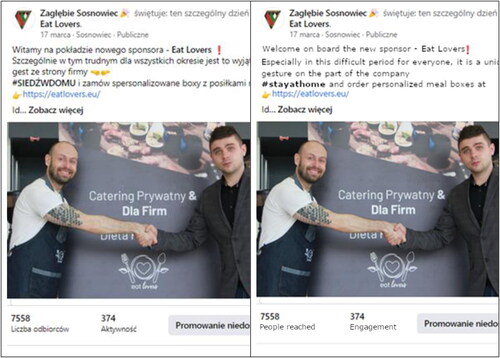
Moreover, a foundation initiative was also undertaken by Zagłębie Sosnowiec fans who decided to support the local health services. In this regard, it was observed that the fans contacted the representatives of the medical staff of Sosnowiec City Hospital and delivered the indicated products, including cleaning agents, mineral water and anti-virus agents ().
Moreover, the first wave of the pandemic in 2020 also coincided with Easter. At this particular point in time, sports clubs usually tend to pay attention to the intensification of socially responsible activities. However, the pandemic meant that this time such projects and actions were not as linear and simple to perform, since social distancing was to be taken into consideration. Therefore, to combat this, the representatives of the club, along with some of their loyal fans, took it upon themselves to wear personal protective equipment and visit other fans residences to them sought after club souvenirs. In this scenario, the choice of community welfare and service was shifted on to the fans who displayed excellent attendance for years and strongly identified with the region as well. Among these people was an ardent fan, Jerzy Włodarczyk, who is considered to be an icon in the fan community for this particular club. In addition to this, the delegation also visited the former players, and a video report was published on the social media fan page of Zagłębie Sosnowiec ().
Moreover, in order to take care of its stakeholders, Zagłębie Sosnowiec also organized two special campaigns that brought in relatively high benefits to the medical community. The first one of these was carried out in collaboration with the club's sponsors – C.H. Plejada Sosnowiec and Eat Lovers. This joint action was primarily intended towards raising the spirits of the local community. For this purpose, the football players, and the employees of Zagłębie Sosnowiec club took part in the #willbebetter (pol. #będziedobrze) initiative. They posed alongside alcoholic bars, a popular hangout spot for avid football fans, to encourage fans to be more optimistic about the grim situation that was unfolding throughout the world ().
The second social activity was carried out in partnership with Eat Lovers (Plejada, Eat Lovers). The main aim of this particular activity was to deliver food items to the Specialist Hospital in Chorzów, and the Provincial Hospital in Tychy. The company, Eat Lovers, was responsible for the logistics part of the project. Using, among others, special thermal containers and cars adapted for food transport, they were responsible for providing meals of appropriate quality in a non-contact delivery setting, to the hospital establishments. The food itself was purchased by C.H. Plejada, from the restaurants that operated within the gallery (including Thai Express).
Apart from the aforementioned activities, Zagłębie Sosnowiec also carried out a number of initiatives related to the slogan “Zagłębie Sosnowiec vs COVID-19". The first part of the initiative was the auction of a T-shirt belonging to the team's coach at the time – Dariusz Dudek (). It has been reported that the entire auction amount was transferred towards the purchase of funds for the hospital. The T-shirt was sold for PLN 1666.
The second stage of the campaign was the sale of "virtual" tickets, for the "Zagłębie vs COVID-19" match. Although the virtual tickets did not entitle anyone to enter the stadium, they were, however, considered to be a symbolic payment that was donated by fans to help the health services and professionals in combating the virus. When making a payment, a fan would receive a "virtual ticket" at his e-mail address, which confirmed his participation in the "Zagłębie vs COVID-19" match. Moreover, the fans were also given an option to share the personal ticket on their social media platforms, so as to display their loyalty towards the club. These Action-related posts have been presented in .
Figure 9. (a) announcement of the match "Zagłębie vs Covid-19", (b) result of the match Zagłębie vs Covid-19 ".
Source: Zagłębie Sosnowiec – official fan page.
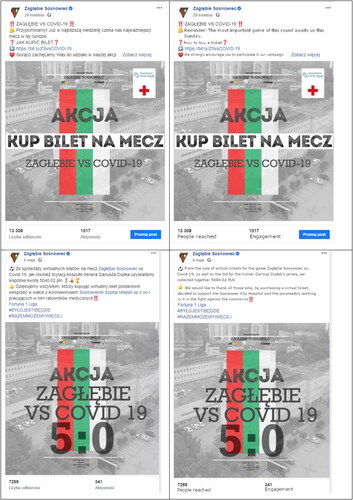
It was observed that despite the Covid-19 pandemic and its severity in terms of the fear and uncertainty of the quality of life, several hundred fans purchased virtual tickets to be able to join the action. The cost of the ticket was either a payment of PLN 10 (although it was possible to purchase more than one ticket) or a voluntary payment of any other amount into the account. The sale of tickets for the "Zagłębie vs COVID-19”match, and the coach's T-shirt were sold for a total of PLN 5,040.02. Surprisingly, this sum of money is one of the record rebounds in the history of Zagłębie Sosnowiec’s club.
4.2. Range analysis
In order to find out if a certain type of a post affects the reach to the target audience, 5 categories have been distinguished:
CSR (COVID-19),
Birthdays of footballers,
Match previews,
Match results,
Information about sponsors.
Such a division has been determined by the observation that the posts pertaining to such categories are the most frequently and regularly published types of posts on the official social media fan pages of Zagłębie Sosnowiec. For this purpose, the data concerning the last 10 posts has been separated in accordance with the adopted methodology, and is presented in . The visual representation of the distribution is shown in .
Table 1. The reach of posts on the official Zagłębie Sosnowiec profile on Facebook.
Following the first approach which pertains to treating a set of 10 posts as a population, it should be noted that on average, the greatest reach is achieved by posts which contain the match results. It should also be noted that the second place in terms of post popularity and reach is undertaken by the CSR-related posts. Moreover, it has been observed that these two categories of posts differ significantly from the rest of the categories that have been included in the mix (match previews, birthdays of footballers and information about sponsors).
Visualizing the level of reach in has allowed us to assume that the CSR and match results posts have, on average, greater reach than the other types of posts that have been identified. Therefore, according to the second approach considered, this supposition was checked by using the Kruskal-Wallis test. Based on the calculated values of the KW test, the null hypothesis should thus be rejected. This means that the distributions in these samples are not identical in nature. The next step for us was then to determine the differences in the medians across the pairs of the post categories that have been identified. The results of these have been presented in .
Table 2. The results of the pairwise comparison of factors using the Mann-Whitney test.
Based on the U-Mann-Whitney tests for the pairs of posts, it should be stated that the posts pertaining to the match results significantly differentiate the average range as compared to the other categories, such as the information about sponsors match previews and the birthdays of footballers. Moreover, it can be observed that the posts from the CSR (COVID-19) category significantly differ, at a significance level of 0.1, especially in comparison to the posts related to information about sponsors, match previews and the birthdays of footballers. The average coverage in the categories of information about sponsors, match previews and birthdays of footballers does not significantly differ when it comes to the statistics of these variables.
5. Conclusion and policy implications
Apart from Zagłębie Sosnowiec, many other clubs in Poland, including Miedź Legnica, Stomil Olsztyn, and Radomiak Radom have chosen pro-social activities that have been aimed towards helping communities affected by the novel coronavirus (1liga.org). It is noteworthy that in the absence of physical matches, it has been particularly imperative to maintain and shape the relationships with the club’s fans. Activities in the field of social responsibility have not only allowed for effective relationship management, but also tend to go beyond the traditional sports activities.
From the point of view of running a business, one of the advantages of undertaking initiatives in the field of corporate social responsibility, is the increase in the media coverage. In this regard, Zagłębie Sosnowiec undertook a number of pro-social activities in response to the COVID-19 pandemic, and published them on the club's official fan page. As a result, relatively high ranges were observed as compared to other types of occasional posts, such as birthdays, or even posts from the sponsors of the club. Such a dependence was confirmed in these studies with the use of the relevant statistical inference methods. Furthermore, the posts regarding the match results still tend to have the greatest reach. However, at a time when the matches were not being held in physical form (as in the case of the league suspension in March 2020), the information posted on CSR activities tended to be the most popular.
The limitations of the study show that the scope of the study was narrowed to one football club only. However, research has shown that CSR posts, due to their general nature (they are aimed at fans, and also at people who are not related to football, but support pro-social activities) achieved relatively higher reach. The practical implications of this study included the need to emphasize upon the meaning of social activity, which may be an important element in shaping relations with stakeholders in the future. Research has also shown that posts of this type reach a wider audience on average.
The possibilities of extending this study include conducting similar in-depth research studies, based on other sports clubs, and aimed at explaining why CSR posts reach such ranges. It is also worthy to analyse the number and type of interactions of the individual types of posts that are posted on the social media pages. Moreover, from the management point of view, one can focus on identifying the impact of the image of a sports club, as shaped by their CSR activities, on acquiring sponsors.
Disclosure statement
No potential conflict of interest was reported by the authors.
References
- 1liga.org. (2020). Pomocna ręka kibiców z Fortuna 1 Ligi. Razem przeciwko koronawirusowi. https://1liga.org/aktualnosci/pomocna-reka-kibicow-z-fortuna-1-ligi-razem-przeciwko-koronawirusowi-8732
- Abdeen, A., Rajah, E., & Gaur, S. S. (2016). Consumers’ beliefs about firm’s CSR initiatives and their purchase behaviour. Marketing Intelligence & Planning, 34(1), 2–18. https://doi.org/10.1108/MIP-06-2014-0107
- Babiak, K., & Wolfe, R. (2006). More than just a game? Corporate social responsibility and Super Bowl XL. Sport Marketing Quarterly, 15(4), 214.
- Blomstrom, R. L., & Davis, K. (1975). Business and society: Environment and responsibility. McGraw-Hill.
- Breitbarth, T., & Harris, P. (2008). The role of corporate social responsibility in the football business: Towards the development of a conceptual model. European Sport Management Quarterly, 8(2), 179–206. https://doi.org/10.1080/16184740802024484
- Carrol, A. (1979). A-three-dimentional conceptual model of corporate performance. Academy of Management Review, 4, 499.
- Castaldo, S., Perrini, F., Misani, N., & Tencati, A. (2009). The missing link between corporate social responsibility and consumer trust: The case of fair trade products. Journal of Business Ethics, 84(1), 1–15. https://doi.org/10.1007/s10551-008-9669-4
- Dahlsrud, A. (2008). How corporate social responsibility is defined: An analysis of 37 definitions. Corporate Social Responsibility and Environmental Management, 15(1), 1–13. https://doi.org/10.1002/csr.132
- Deloitte, F. M. L. (2020). Sports Business Group.
- Dimitropoulos, P. E., & Vrondou, O. (2015). Corporate social responsibility and firm value in the sport recreation sector: A review. Business Management and Strategy, 6(2), 28–43. https://doi.org/10.5296/bms.v6i2.8542
- Du, S., Bhattacharya, C. B., & Sen, S. (2011). Corporate social responsibility and competitive advantage: Overcoming the trust barrier. Management Science, 57(9), 1528–1545. https://doi.org/10.1287/mnsc.1110.1403
- Farooq, O., Rupp, D. E., & Farooq, M. (2017). The multiple pathways through which internal and external corporate social responsibility influence organizational identification and multifoci outcomes: The moderating role of cultural and social orientations. Academy of Management Journal, 60(3), 954–985. https://doi.org/10.5465/amj.2014.0849
- Filizöz, B., & Fişne, M. (2011). Corporate social responsibility: A study of striking corporate social responsibility practices in sport management. Procedia - Social and Behavioral Sciences, 24, 1405–1417. https://doi.org/10.1016/j.sbspro.2011.09.062
- Freeman, A. L., & Miles, S. (2002). Developing stakeholders theory. Journal of Management Studies, 1(39), 1–21.
- Godfrey, P. C. (2009). Corporate social responsibility in sport: An overview and key issues. Journal of Sport Management, 23(6), 698–716. https://doi.org/10.1123/jsm.23.6.698
- Hadzik, A., Tomik, R., & Ryśnik, J. (2015). Międzynarodowe widowisko sportowe jako przykład produktu turystyki sportowej, [in:] Turystyka sportowa–kulturowy potencjał i perspektywy rozwoju, M. Akademia Wychowania Fizycznego Im. Eugeniusza Piaseckiego w Poznaniu, Poznań, 129–137.
- He, H., & Harris, L. (2020). The impact of Covid-19 pandemic on corporate social responsibility and marketing philosophy. Journal of Business Research, 116, 176–182. https://doi.org/10.1016/j.jbusres.2020.05.030
- Hess, D., Rogovsky, N., & Dunfee, T. W. (2002). The next wave of corporate community involvement: Corporate social initiatives. California Management Review, 44(2), 110–125. https://doi.org/10.2307/41166125
- Kantor, A., & Kubiczek, J. (2021). Polish culture in the face of the COVID-19 pandemic crisis. Journal of Risk and Financial Management, 14(4), 181. https://doi.org/10.3390/jrfm14040181
- Keinert, C. (2008). Corporate social responsibility as an international strategy. Springer Science & Business Media.
- Kihl, L., Babiak, K., & Tainsky, S. (2014). Evaluating the implementation of a professional sport team’s corporate community involvement initiative. Journal of Sport Management, 28(3), 324–337. https://doi.org/10.1123/jsm.2012-0258
- Kim, J. S., Song, H., Lee, C.-K., & Lee, J. Y. (2017). The impact of four CSR dimensions on a gaming company’s image and customers’ revisit intentions. International Journal of Hospitality Management, 61, 73–81. https://doi.org/10.1016/j.ijhm.2016.11.005
- Kruskal, W. H., & Wallis, W. A. (1952). Kruskall–Wallis one way analysis of variance. Journal of the American Statistical Association., 47(260), 583–621. https://doi.org/10.1080/01621459.1952.10483441
- Kubiczek, J., & Kantor, A. (2020). Działalność biznesu na rzecz kultury w kontekście koncepcji CSR. Prace Naukowe/Uniwersytet Ekonomiczny w Katowicach, 41–52.
- Kubiczek, J., & Pietrzyk, A. (2020). Kluby sportowe i ich działania z zakresu społecznej odpowiedzialności biznesu. Prace Naukowe/Uniwersytet Ekonomiczny w Katowicach, 99–107.
- Lii, Y.-S., Wu, K.-W., & Ding, M.-C. (2013). Doing good does good? Sustainable marketing of CSR and consumer evaluations. Corporate Social Responsibility and Environmental Management, 20(1), 15–28. https://doi.org/10.1002/csr.294
- Maciejewski, G. (2015). Konsumenci wobec nowych trendów w konsumpcji–wyniki badań. Studia Ekonomiczne, 232, 124–134.
- Malchrowicz-Mośko, E. M. (2015). Pozytywne oraz negatywne implikacje turystyki olimpijskiej. Turystyka Kulturowa, 8, 57–74.
- Mann, H. B., & Whitney, D. R. (1947). On a test of whether one of two random variables is stochastically larger than the other. The annals of mathematical statistics, 50–60. https://www.jstor.org/stable/2236101
- Maon, F., Lindgreen, A., & Swaen, V. (2009). Designing and implementing corporate social responsibility: An integrative framework grounded in theory and practice. Journal of Business Ethics, 87(S1), 71–89. https://doi.org/10.1007/s10551-008-9804-2
- Marom, S., & Lussier, R. N. (2020). Corporate social responsibility during the coronavirus pandemic: An interim overview. Business and Economic Research, 10(2), 250. https://doi.org/10.5296/ber.v10i2.17046
- Marsden, C. (2001). The role of public authorities in corporate social responsibility. Agence Alter Website. http://www.Alter.Be/Socialresponsibility/People/Marchri/En/DisplayPerson (10th of May 2017).
- Mirza, N., Hasnaoui, J. A., Naqvi, B., & Rizvi, S. K. A. (2020). The impact of human capital efficiency on Latin American mutual funds during Covid-19 outbreak. Swiss Journal of Economics and Statistics, 156(1), 1–7. https://doi.org/10.1186/s41937-020-00066-6
- Mirza, N., Naqvi, B., Rahat, B., & Rizvi, S. K. A. (2020). Price reaction, volatility timing and funds’ performance during Covid-19. Finance Research Letters, 36, 101657. https://doi.org/10.1016/j.frl.2020.101657
- Mizerek, H. (2017). Studium przypadku w badaniach nad edukacją. Istota i paleta zastosowań. Przegląd Pedagogiczny, 1, 9–22.
- Newell, P. (2005). Citizenship, accountability and community: The limits of the CSR agenda. International Affairs, 81(3), 541–557. https://doi.org/10.1111/j.1468-2346.2005.00468.x
- Parganas, P., Liasko, R., & Anagnostopoulos, C. (2017). Scoring goals in multiple fields. Sport, Business and Management: An International Journal, 7(2), 197–215. https://doi.org/10.1108/SBM-11-2016-0072
- Park, B. I., Chidlow, A., & Choi, J. (2014). Corporate social responsibility: Stakeholders influence on MNEs’ activities. International Business Review, 23(5), 966–980. https://doi.org/10.1016/j.ibusrev.2014.02.008
- Pomering, A., & Dolnicar, S. (2009). Assessing the prerequisite of successful CSR implementation: Are consumers aware of CSR initiatives? Journal of Business Ethics, 85(S2), 285–301. https://doi.org/10.1007/s10551-008-9729-9
- Porter, M. E., & Kramer, M. R. (2006). The link between competitive advantage and corporate social responsibility. Harvard Business Review, 84(12), 78–92.
- Ranaweera, C., & Prabhu, J. (2003). The influence of satisfaction, trust and switching barriers on customer retention in a continuous purchasing setting. International Journal of Service Industry Management, 14(4), 374–395. https://doi.org/10.1108/09564230310489231
- Rhou, Y., Singal, M., & Koh, Y. (2016). CSR and financial performance: The role of CSR awareness in the restaurant industry. International Journal of Hospitality Management, 57, 30–39. https://doi.org/10.1016/j.ijhm.2016.05.007
- Rizvi, S. K. A., Yarovaya, L., Mirza, N., & Naqvi, B. (2020). The impact of COVID-19 on valuations of non-financial European firms. Available at SSRN 3705462.
- Rowe, K., Karg, A., & Sherry, E. (2019). Community-oriented practice: Examining corporate social responsibility and development activities in professional sport. Sport Management Review, 22(3), 363–378. https://doi.org/10.1016/j.smr.2018.05.001
- Schulenkorf, N., Sherry, E., & Rowe, K. (2016). Sport for development: An integrated literature review. Journal of Sport Management, 30(1), 22–39. https://doi.org/10.1123/jsm.2014-0263
- Secchi, D. (2007). Utilitarian, managerial and relational theories of corporate social responsibility. International Journal of Management Reviews, 9(4), 347–373. https://doi.org/10.1111/j.1468-2370.2007.00215.x
- Sheth, H., & Babiak, K. M. (2010). Beyond the game: Perceptions and practices of corporate social responsibility in the professional sport industry. Journal of Business Ethics, 91(3), 433–450. https://doi.org/10.1007/s10551-009-0094-0
- Stawicka, E. (2016). Aspekt społecznej odpowiedzialności w turystyce. Współczesne Problemy Rozwoju Turystyki. Turystyka i Rozwój Regionalny, (6), 99–111. http://yadda.icm.edu.pl/yadda/element/bwmeta1.element.agro-995025d9-c1c0-4a73-9026-b0009dcee85d
- Su, C.-W., Huang, S.-W., Qin, M., & Umar, M. (2021). Does crude oil price stimulate economic policy uncertainty in BRICS? Pacific-Basin Finance Journal, 66, 101519. https://doi.org/10.1016/j.pacfin.2021.101519
- Su, C.-W., Sun, T., Ahmad, S., & Mirza, N. (2021). Does institutional quality and remittances inflow crowd-in private investment to avoid Dutch disease? A case for emerging seven (E7) economies. Resources Policy, 72, 102111. https://doi.org/10.1016/j.resourpol.2021.102111
- Umar, M., Mirza, N., Rizvi, S. K. A., & Furqan, M. (2021). Asymmetric volatility structure of equity returns: Evidence from an emerging market. The Quarterly Review of Economics and Finance, https://doi.org/10.1016/j.qref.2021.04.016
- Umar, M., Su, C.-W., Rizvi, S. K. A., & Shao, X.-F. (2021). Bitcoin: A safe haven asset and a winner amid political and economic uncertainties in the US? Technological Forecasting and Social Change, 167, 120680. https://doi.org/10.1016/j.techfore.2021.120680
- Vallerand, R. J., Ntoumanis, N., Philippe, F. L., Lavigne, G. L., Carbonneau, N., Bonneville, A., Lagacé-Labonté, C., & Maliha, G. (2008). On passion and sports fans: A look at football. Journal of Sports Sciences, 26(12), 1279–1293. https://doi.org/10.1080/02640410802123185
- Walker, M., & Heere, B. (2011). Consumer attitudes toward responsible entities in sport (CARES): Scale development and model testing. Sport Management Review, 14(2), 153–166. https://doi.org/10.1016/j.smr.2010.08.001
- Walters, G., & Tacon, R. (2010). Corporate social responsibility in sport: Stakeholder management in the UK football industry. Journal of Management & Organization, 16(4), 566–586. https://doi.org/10.1017/S1833367200001942
- Yarovaya, L., Mirza, N., Abaidi, J., & Hasnaoui, A. (2021). Human capital efficiency and equity funds’ performance during the COVID-19 pandemic. International Review of Economics & Finance, 71, 584–591. https://doi.org/10.1016/j.iref.2020.09.017
- Zappalà, G., & Arli, D. (2010). Corporate Community Involvement among leading companies in Australia & New Zealand. In The Third Sector as Civil Society in Australasia: Identity, Role and Influence in the New Century.

